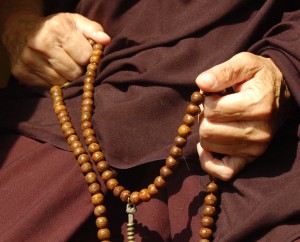The following is an excerpt from a teaching by Jetsunma Ahkon Lhamo called “Entering the Path”
It is not only in the beginning of the path that obstacles happen; they occur periodically throughout your experience of the path. They don’t end. They are like PMS. So each and every time obstacles arise, you have to simply support and nurture yourself. Go through it. Simply take yourself by the hand as if you were a child. Think of this as your kingdom, and you’re a good king or a queen. What should you do to responsibly negotiate yourself through this? You think like that.
Remember the first and most important point to consider: not to make it a big deal. Don’t get yourself all worked up. Try to keep your mind calm, because remember, the obstacles will ripen more quickly and more violently if the mind is excitable, emotional and violent, if it has so many ups and downs. So take yourself to a movie or something, you know, calm down and walk yourself through this. Remember that the biggest tool that you have right now is the accumulation of merit. Within the continuum of your mindstream there are cause-and-effect relationships that have not yet fully ripened. The causes are deeply embedded within your mind. Accumulate more merit and the more meritorious causes from the past will be drawn forth and will come to your rescue.
The name of the game is to pacify obstacles and to draw forth and accumulate as much merit as possible. The mind will become spacious so that we can awaken in incremental degrees to our own nature. To the degree that we begin to awaken to our nature, to that degree, obstacles will no longer affect us.
Upon attaining the Bodhisattva path and moving through that path to the higher bhumis, one is no longer susceptible in the same way to cause-and-effect relationships. They become pacified within the mindstream. They are still expressed in some way, to exhibit the normal characteristics of life. Yet the high level Bodhisattva is not hooked and condemned by these obstacles the way ordinary sentient beings are. These obstacles do not cause them to wander in samsara the way ordinary sentient beings do. So that’s what we have to look forward to. The name of the game is pacifying obstacles and bringing forth as much merit and opportunity as possible until that day happens. For this you can use the practices.
The moment you decide to be on the path and practice, you should immediately begin to accumulate the Seven-Line Prayer. Repeat it on a regular basis every day. That is a merit machine for you. Then as soon as possible, as soon as you have accumulated approximately 10,000, begin to practice Ngöndro or preliminary practice. The reason why it is set up that way is so that the mind can develop and open up to the primordial wisdom nature.
This is the opportunity that you have, and this is the method that you should use. Be your own best friend. Be a good king or queen. Be intelligent and responsible and think beneath the surface. Do not read the things on the surface any more. That’s for children; that’s not for you. You’re on the path now. Look deeper and see what’s happening. Antidote unhappiness with virtue because unhappiness is caused by non-virtue. Accumulate virtue to the degree that you can begin to experience the truly virtuous nature that is your nature. Because if that nature that you truly are were allowed to express itself unimpeded, the display of that nature is the very Bodhicitta or great compassion that we try so hard to emulate.
Your nature is in truth that great unequalled Bodhicitta. You are not a bag of non-virtue; you are suchness, you are that great kindness. When you practice in that way, it’s like cleaning a glass by which the sun can shine through, and the sun is your nature. But do not let your image of the sun be closed down or distorted because of your own habitual tendency to simply ride on the surface and do whatever you think seems right. For the first time, look deeper and understand cause-and-effect relationships. Implement the causes that will bring about happiness and freedom, and pacify, through suppression, those non-virtuous characteristics that will bring you unrest and suffering.
How does this suppression look? Not like faking it and pretending you don’t have these things. That is not suppressing, that is neurosis. That is acting inappropriately. Suppression means that you take the antidote, and you apply it through practice, through contemplation, through offering, through generosity, through kindness. Practicing these things is suppression because the mind remains firm and stable in the way of virtue rather than remaining caught up in amplifying non-virtue.
You are a creature of choices. Isn’t it amazing! A creature of choices! At every turn you can make choices. You cannot choose what experiences seem to come to you because the cause-and-effect relationships have already been laid out for them, but you can choose how to respond, and you can choose how to create future causes. And for this I am exceedingly glad. Choose well then, not like a child. Choose like a king or a queen— noble, thoughtful, educated and sound in your mind. Create the habit of virtue and you will create a kingdom of virtue that will be your life.
Copyright © Jetsunma Ahkon Lhamo. All rights reserved







